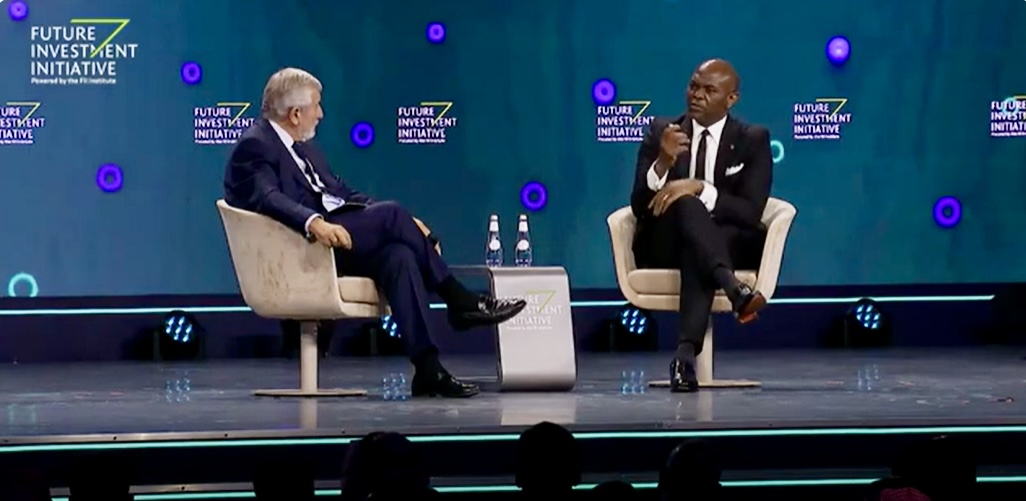
Our Founder, Mr. Tony O. Elumelu’s Remarks from his fireside chat with Richard Attias, CEO FII Institute, on ‘How Africapitalism drives Inclusive Growth’
Africapitalism stems from my experience.
I am an African, born and bred in Africa and I have done business in Africa. And I have come to see firsthand the level of poverty on the continent. I have come to see the energy, the youth, the aspiration of our young ones.
Africa is a continent of about 1.4 billion people and the average age is 20 years old. Yet, joblessness remains an issue, lack of access to economic opportunities, lack of access to health care, and so from my own life story, I realise that in Africa, the private sector has a key role to play in developing the continent, and this role is not relegated to one person, or the government alone. We should not have an entitlement mentality that someone one will come and develop the continent for us.
So through the Tony Elumelu Foundation, we actively engage/ involve young Africans by getting the African private sector to work together to prioritise our young ones, get the government to create an enabling environment, and hence the philosophy of Africapitalism, which states that in the 21st century, first, no one but us can develop Africa; second, we need all hands on deck in developing Africa; three, we need to prioritise the young ones to whom the future of Africa belongs to. And most importantly, as private sector players, the realisation that it is not the money that we have in our bank account that matters, but how we are able to deploy the capital we have in creating economic opportunities and prosperity for our young ones, and so Africapitalism is a call on the private sector to invest long term in critical sectors of the African economy that have the potential for transforming and catalysing economic empowerment and prosperity on the continent, so that at the end of the day, we all go far and go together, and no one is left behind.
Embedded in it is the philosophy of inclusive growth, equality – empowering young men and particularly our women who have been left behind for a long time and realising that our government must play their own role in catalysing the opportunities that will enable the private sector to take off, and working also with philanthropic organisations in and outside of Africa to develop the continent.
One of the reasons that Africapitalism has been accepted and is being practiced by quite a number of people is because we don’t just preach, we don’t just theorise, we practice. So, in our Group we have Transcorp, which is the largest electricity generating company in Nigeria today. Transcorp has a combined electricity generating capacity of 2000MW, so to the ordinary eye, that is an economic investment that yields profit for the investors, but more importantly, we all know that access to electricity is the single most critical factor that we need to fix if we must develop Africa, as it is needed for businesses, schools, and hospitals to run. This is Africapitalism in action; making profit to help the economy, while simultaneously investing in critical sectors that can transform the society. We need massive investment in electricity across the African continent, not just for profitability but also to remedy the challenges that restrain the continent’s development.
We need to wire our infrastructure in a way that encourages intra-African trade. We need to produce what our people need. We need to create a bigger market for everyone of us, and that is why we support this new movement by the AfCFTA to create the world’s largest market linkage in Africa. But more importantly, we need to empower the young generation of Africans to be able to create what Africans need. As the philosophy of Africapitalism infers, we must realise that no one owes us our development – we as Africans must work hard to develop our continent. We must show that in this 21st century, there Africans that are investors on the continent.
If we don’t show confidence in our continent, who else will show confidence in our continent? The realisation that what we seek today are the demographic dividends, i.e., the population. We have a huge population, and more importantly, the demography is very favourable – young people – that is a huge market for the world, huge favour for the world, but we need to catalyse it in a way that is positive, and not in a way that people become disenchanted with life and now begin to embrace migration or extremism. That is another call that I always make to African leaders, friends of Africa, and I am happy to be in the Kingdom of Saudi Arabia because this is an opportunity to take the message to the world.
Africa is ready for investments; Africa is a land of opportunities. We have challenges, but despite that, the opportunities are huge, and people should take advantage of the opportunities. We need a marshal plan for Africa. We need to mobilise huge long-term capital into the continent, to enable us leapfrog and fix the infrastructure that we need to develop.
